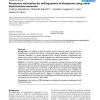Free Online Productivity Tools
i2Speak
i2Symbol
i2OCR
iTex2Img
iWeb2Print
iWeb2Shot
i2Type
iPdf2Split
iPdf2Merge
i2Bopomofo
i2Arabic
i2Style
i2Image
i2PDF
iLatex2Rtf
Sci2ools
140
click to vote
BMCBI
2006
2006
Parameter estimation for stiff equations of biosystems using radial basis function networks
Background: The modeling of dynamic systems requires estimating kinetic parameters from experimentally measured time-courses. Conventional global optimization methods used for parameter estimation, e.g. genetic algorithms (GA), consume enormous computational time because they require iterative numerical integrations for differential equations. When the target model is stiff, the computational time for reaching a solution increases further. Results: In an attempt to solve this problem, we explored a learning technique that uses radial basis function networks (RBFN) to achieve a parameter estimation for biochemical models. RBFN reduce the number of numerical integrations by replacing derivatives with slopes derived from the distribution of searching points. To introduce a slight search bias, we implemented additional data selection using a GA that searches data-sparse areas at low computational cost. In addition, we adopted logarithmic transformation that smoothes the fitness surface to...
Related Content
| Added | 10 Dec 2010 |
| Updated | 10 Dec 2010 |
| Type | Journal |
| Year | 2006 |
| Where | BMCBI |
| Authors | Yoshiya Matsubara, Shinichi Kikuchi, Masahiro Sugimoto, Masaru Tomita |
Comments (0)

